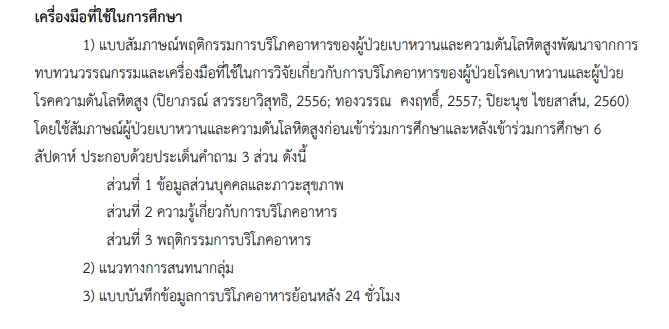การพัฒนากลุ่มอาหารสุขภาพรักษ์ไต ตำบลกุมภวาปี อำเภอกุมภวาปี จังหวัดอุดรธานี
คำสำคัญ:
การพัฒนากลุ่มอาหารสุขภาพรักษ์ไต, การมีส่วนร่วมของชุมชนบทคัดย่อ
การศึกษานี้มีวัตถุประสงค์เพื่อพัฒนากลุ่มอาหารสุขภาพรักษ์ไต ในการป้องกันโรคไตเรื้อรังในกลุ่มผู้ป่วยเบาหวานและความดันโลหิตสูง โดยอาศัยการมีส่วนร่วมของชุมชน ตำบลกุมภวาปี อำเภอกุมภวาปี จังหวัดอุดรธานี ผ่านวงจรการบริหารงานคุณภาพ Deming’s model ผู้มีส่วนร่วมในการศึกษา ประกอบด้วย ผู้ป่วยเบาหวานและความดันโลหิตสูง ผู้ดูแลผู้ป่วยเบาหวานและความดันโลหิตสูง อสม. ผู้ใหญ่บ้าน สมาชิกกลุ่มผักปลอดสารพิษเฉลิมพระเกียรติ กลุ่มแม่บ้าน และผู้สนใจที่อยู่อาศัยที่ ตำบลกุมภวาปี อำเภอกุมภวาปี จังหวัดอุดรธานี เก็บรวบรวมข้อมูลโดยการสอบถาม การสัมภาษณ์ การสนทนากลุ่ม และจากแบบบันทึกการบริโภคอาหารย้อนหลัง ข้อมูลเชิงปริมาณ วิเคราะห์ด้วยสถิติเชิงพรรณนา ได้แก่ ความถี่ ร้อยละ ค่าเฉลี่ย ข้อมูลเชิงคุณภาพ ใช้การวิเคราะห์ข้อมูลเชิงเนื้อหา
ผลการศึกษา พบว่า ผู้ป่วยเบาหวานและความดันโลหิตสูงมีความรู้เรื่องการบริโภคอาหารในระดับปานกลาง ส่วนใหญ่ยังไม่ทราบว่าการควบคุมการบริโภคอาหารสามารถป้องกันการเกิดโรคไตเรื้อรังได้ และต้องจำกัดประเภทและปริมาณของอาหารที่ควรบริโภคในแต่ละวัน นอกจากนี้ยังพบว่า การมีส่วนร่วมของครอบครัวในการดูแลเรื่องอาหารยังมีน้อย ทั้งในด้านการปรุงอาหาร การเลือกซื้ออาหารที่เหมาะสมกับโรคที่ผู้ป่วยเป็นอยู่ จากข้อค้นพบดังกล่าว ชุมชนได้จัดตั้งกลุ่มอาหารสุขภาพรักษ์ไตตำบลกุมภวาปี กลุ่มได้ร่วมกันวางแผนเพื่อดำเนินการ ด้วยการ (1) ปรับระดับความรู้เรื่องโรคไตเรื้อรัง และพฤติกรรมการบริโภคอาหารในกลุ่มผู้ป่วยและผู้ดูแล (2) พัฒนาขีดความสามารถของ อสม. ผู้นำชุมชน แกนนำกลุ่มผักปลอดสารพิษและกลุ่มแม่บ้าน (3) แลกเปลี่ยนเรียนรู้การปลูกผักปลอดสารพิษ และ (4) ปรับเปลี่ยนพฤติกรรมการบริโภคอาหาร
ผลการดำเนินงาน พบว่า (1) ผู้ป่วยมีความรู้เกี่ยวกับการบริโภคอาหาร และมีพฤติกรรมการบริโภคอาหารที่เหมาะสมอยู่ในระดับดีเพิ่มขึ้น สามารถควบคุมระดับน้ำตาลในเลือดให้อยู่ในเกณฑ์ปกติ (70 – 130 มก./ดล.) ร้อยละ 80.0 และมีอัตราการกรองของไตที่ดีขึ้น ( ≥ 90 มล./ นาที/ 1.73 ตารางเมตร) ร้อยละ 70.0 เนื่องด้วยครอบครัวเข้ามามีส่วนร่วมในการดูแลด้านอาหารของผู้ป่วยเพิ่มมากขึ้น ทั้งในเรื่องการเลือกวัตถุดิบสำหรับประกอบอาหาร การปรุงอาหารที่เหมาะสม (2) อสม. ผู้นำชุมชน และแกนนำกลุ่มต่างๆ มีความรู้เรื่องโรคไตเรื้อรังเพิ่มขึ้น และสามารถให้คำแนะนำเกี่ยวกับการบริโภคอาหารที่เหมาะสมแก่ผู้ป่วยและผู้ดูแลได้ (3) กลุ่มแม่บ้านได้ถ่ายทอดความรู้เรื่องอาหารที่ควรบริโภคสู่ประชาชนในชุมชนได้ (4) กลุ่มผักปลอดสารพิษ สนับสนุนการปลูกผักปลอดสารพิษสำหรับบริโภคในครัวเรือน ส่งผลให้สมาชิกปลูกผักปลอดสารพิษสำหรับรับประทานเอง เพิ่มมากขึ้น

ดาวน์โหลด
เผยแพร่แล้ว
รูปแบบการอ้างอิง
ฉบับ
ประเภทบทความ
สัญญาอนุญาต
ลิขสิทธิ์ (c) 2024 วารสารการส่งเสริมสุขภาพและอนามัยสิ่งแวดล้อมบทความในวารสารนี้มีลิขสิทธิ์โดยและเผยแพร่ภายใต้สัญญาอนุญาต Creative Commons แบบแสดงที่มา-ไม่ใช้เพื่อการค้า-ไม่ดัดแปลง 4.0 ระหว่างประเทศ (CC BY-NC-ND 4.0)
สามารถอ่านและนำไปใช้เพื่อวัตถุประสงค์ทางวิชาการ เช่น การสอน การวิจัย หรือการอ้างอิง โดยให้เครดิตแก่ผู้เขียนและวารสารอย่างเหมาะสม
ห้ามใช้หรือดัดแปลงบทความโดยไม่ได้รับอนุญาต
ข้อความที่ปรากฏในบทความเป็นความคิดเห็นของผู้เขียนแต่เพียงผู้เดียว
ผู้เขียนต้องรับผิดชอบต่อเนื้อหาและความถูกต้องของบทความของตนทั้งหมด
การนำไปใช้ซ้ำหรือเผยแพร่ซ้ำในรูปแบบอื่นต้องได้รับอนุญาตจากวารสาร





